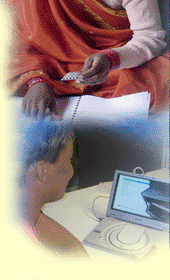
PRIME II implemented cost-effective, innovative blended learning approaches, appropriate to local situations. These approaches included:
- Self-directed and self-paced learning
- Combining traditional and peer-assisted learning
- Interactive simulations.
Key Results
-
Ghana: PRIME II worked with Ghana Health Services to design and implement a self-paced learning (SPL) approach in postabortion care/safe motherhood as an alternative to their traditional group-based classroom training for doctors, nurses and midwives. SPL learners showed 25-49% higher knowledge and skills gains and 4.5-6% higher performance gains in simulated service delivery than participants in the traditional approach.
-
Armenia: The Ministry of Health and PRIME II developed and implemented a blended self-paced learning approach in safe motherhood clinical skills to train nurses and midwives at rural health posts and ambulatory care centers in Lori province. The program, which introduced the concept of blended learning in Armenia, demonstrated that nurses and midwives working at the most primary level of care could effectively take on an expanded scope of work in maternal and infant health. A final evaluation showed provider observation scores on tasks successfully completed improving from 37% to 69% in prenatal care and 56% to 76% in postpartum care.
-
Benin: In November 2002, revised reproductive health (RH) protocols were nationally approved by the Ministry of Health (MOH). PRIME II implemented a blend of classic training, tutoring and self-directed learning in three departments (Borgou/Alibori, Atlantique/Littoral and Mono/Couffo) to assist the MOH in training providers in the use of the protocols. As a result of this approach, providers (physicians, midwives, nurses) in all three regions significantly improved their knowledge test scores in sexually transmitted infections, infant health and safe motherhood, and earned high observation scores on use of the protocols.
-
Dominican Republic: PRIME II used traditional classroom, self-directed and peer-assisted learning approaches along with supportive radio programming to train volunteer health promoters in family planning counseling and services and prevention of HIV/AIDS and sexually transmitted infections. The promoters work in bateyes, isolated and marginalized slum communities. Promoter knowledge test scores increased from 50% to 82%.
-
Kenya: To determine the feasibility of using DVD technology, PRIME II developed and field-tested two interactive simulations for in-service training of experienced postabortion care providers in Kenya. Observations and interviews confirmed that providers saw the learning approach and tools as easy-to-use, convenient and flexible, and thought the DVD method was especially effective because they remained in control of when they engaged in the learning process and did not have to leave their facilities to update their skills. While the project was mainly intended as a feasibility study, pre- and post-tests showed a 25% learning gain for 17 participating providers.
|











